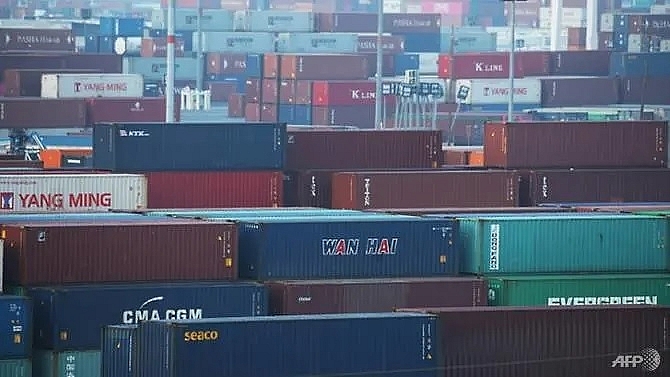US, China working to delay Dec 15 tariffs: Report
 |
| Shipping containers are stacked at the Port of Los Angeles in November 2019. (Photo: AFP/MARIO TAMA) |
Delaying the new duties, which cover about US$160 billion in imports, including consumer favorites like mobile phones, could help reassure markets the two sides are making progress towards ending their trade war.
Officials on both sides say they now expect to continue talking past December 15, when the tariffs are due to kick in, according to The Wall Street Journal.
The report helped move Wall Street futures into positive territory.
US officials have reiterated that any final decision by the American camp belongs to President Donald Trump.
For two months, the two sides have struggled to finalise a partial deal that Trump announced in October.
Statements by US officials have run hot and cold in recent days, with markets swooning last week after Trump said a deal could wait until after next year's elections.
But Larry Kudlow, a top White House economic aide, said Friday a deal was "still close."
Trump launched his trade war in March 2018, demanding that China end practices widely seen as unfair - such as forced technology transfers from US firms, and massive subsidies given to Chinese firms.
But observers say Beijing is highly unlikely to make profound changes to the structure of its economy sought by Washington, which could politically undermine the Communist Party.
Trump has also sought pledges from Beijing to make enormous purchases of US farm exports that experts say may exceed demand in China.
Should the Dec15 tariffs take effect, virtually all the merchandise the United States imports annually from China will be covered by punitive tariffs.
What the stars mean:
★ Poor ★ ★ Promising ★★★ Good ★★★★ Very good ★★★★★ Exceptional
 Tag:
Tag:
Related Contents
Latest News
More News
- Russian President congratulates Vietnamese Party leader during phone talks (January 25, 2026 | 09:58)
- Worldwide congratulations underscore confidence in Vietnam’s 14th Party Congress (January 23, 2026 | 09:02)
- Political parties, organisations, int’l friends send congratulations to 14th National Party Congress (January 22, 2026 | 09:33)
- 14th National Party Congress: Japanese media highlight Vietnam’s growth targets (January 21, 2026 | 09:46)
- 14th National Party Congress: Driving force for Vietnam to continue renewal, innovation, breakthroughs (January 21, 2026 | 09:42)
- Vietnam remains spiritual support for progressive forces: Colombian party leader (January 21, 2026 | 08:00)
- Int'l media provides large coverage of 14th National Party Congress's first working day (January 20, 2026 | 09:09)
- Vietnamese firms win top honours at ASEAN Digital Awards (January 16, 2026 | 16:45)
- ASEAN Digital Ministers' Meeting opens in Hanoi (January 15, 2026 | 15:33)
- ASEAN economies move up the global chip value chain (December 09, 2025 | 13:32)






















 Mobile Version
Mobile Version